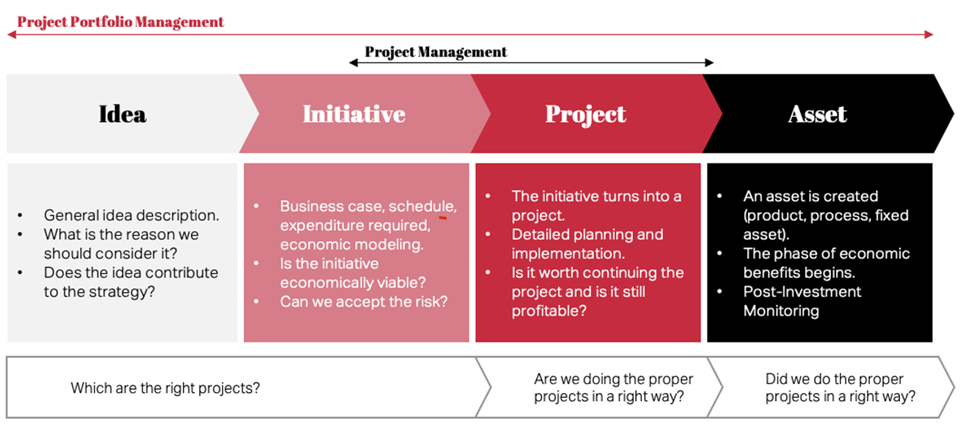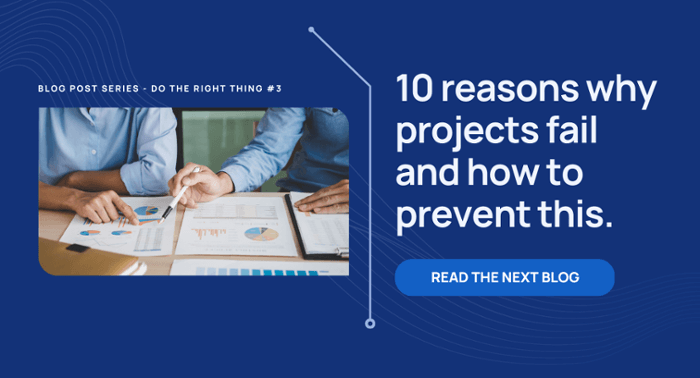Blog post series
Do the right thing - Blog #2
Choosing the right projects can be challenging, especially for complex organizations, but where can this process be improved?
Project management basics
Let’s start with the basics – who does what.
|
PM – Project Manager |
PMO – Project Management Office
|
PPM – Portfolio Project Management
|
|
The person in overall charge of the planning and execution of a particular project. |
The main goal of the PMO is to manage projects by creating standardized procedures and protocols. To maintain the flow of the project and achieve consistency, the PMO uses PPM tools to collect and analyze data to ensure their project portfolio is aligned with the overall strategic planning and goals of the organization, and to empower their team members to be process complaint while handling the project. |
The key focus of PPM is to make sure that all the outcomes in the portfolio support the strategic goals and business objectives of the organization. PPM focuses on selecting the ‘right’ projects at the right time. In other words, it manages projects as a portfolio of investments, balancing risks and keeping the selection strategic. The goal is to balance the implementation of change initiatives and the maintenance of business-asusual, while optimising return on investment. |
Project management process
The dream of any enterprise-level PMO is to align strategy (doing the right projects) and execution (doing projects right) to effectively manage change. While the PMO is focused on ensuring that selected projects are completed successfully leveraging the right processes, technologies, and methodologies, by contrast, PPM ensures that the organization has chosen projects that are aligned to business priorities, goals, and projected ROI.
Effective portfolio management
Effective portfolio management increases business value by aligning projects with the organization’s strategic direction. It also makes the most of limited resources and encourages synergy between projects. Unfortunately, many businesses do portfolio management insufficiently, leading to a lack of strategic results and a mix of all the wrong projects.
Why do projects fail?
Many high-profile projects fail because they succeed…they're ill-conceived efforts directed at achieving goals that have little value or relevance to their host organizations.
According to a widely quoted report by the analyst firm Gartner, 55% up to 75% of all ERP projects fail globally.
Project management focuses on ensuring that the project goals are achieved in an efficient manner. The goals themselves are often “handed down from above”, so the relevance or appropriateness of these is “out of scope” for the discipline of project management. Yet, the widespread projects of dubious value suggests that more attention needs to be paid to decision making in the early stages of a project, when the initiative is just an idea.
Choosing the right projects
These ‘front-end’ decisions usually carry more consequences than those made later on. Most major parameters – scope, funding, timelines etc. are more or less set in stone by the time a project is initiated. The problem is that these decisions are made at a time when the availability of relevant information is at its lowest, highlighting the role of sound judgement and estimation in decision making.
Project management lifecycle
Jakub says, “Many organizations are too much focused on “Project Stage” putting the whole effort on doing the selected projects “in time” and “in budget”, while if there are “no benefits” in the “Asset stage”, excellence in project management will not change the fact that organization will be losing value. For decision-making purpose usually, “10% budget excess” is not actually that painful as “10% sales drop compared with the 10 years’ economic life-cycle forecast. Understanding the long-term impact, expected costs and benefits, project risk and strategic fit is the ultimate goal of growth management."
“60% of companies don’t measure ROI on projects.”
Businesses are about making money, and ROI quantifies the project value. Without it, your chances of success are limited! The main focus of PPM is the strategic horizon of the organization and assuring long-term benefits and growth.
PPM connects the company's strategy with its operations, transforming and communicating high-level goals into understandable and actionable criteria that should be met by new initiatives created by the organization.
Next blog: 10 reasons why projects fail and how to prevent this.



